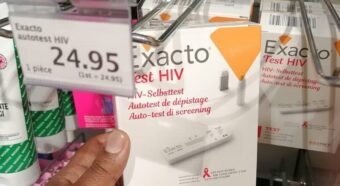On 8th April, 2021, ACB conducted the first Virtual Coffee Session on “HIV/AIDS among Adolescent Girls and Young Women (AGYW) in Africa. With an attendance list of 24 participants from across the continent, this first session brought together ACB Staff, various experts in this field, and young women who are positively living with HIV. The participants included remarkable guest speakers such as, Innocent Modisaotsile (from UNFPA Regional Office in South Africa), Martha Nakato (a Youth Activist from Uganda), Joyce Ouma (a Youth Activist from Kenya), Elise Kenimbeni (a Journalist focusing on SRH and the Youth in Cameroon), and Professor Dhally Menda from Zambia (managing a large Global Fund Project on SRH and the Youth). The specific aims of this AGYW Virtual Coffee Session were to: (i) communicate, share and discuss key policy messages and developments that are of particular relevance to AGYW, such as unequal gender norms that often limit the access of women to HIV information and other structural drivers of HIV, including laws and policies that fail to support the rights of women and (ii) share real-time countries and personal experiences, lessons learnt, best practices and key challenges related to AGYW.
The Bureau conducted this first Virtual Coffee Session as part of its ‘African Voice for the Global Fund Campaign’, which was launched in December 2020. This campaign was initiated after a series of consultations with Africa Constituencies and it seeks to leverage and amplify constituencies’ voices as well as creating buy-in and generate awareness on Africa’s identified priorities, and key asks for the post-2022 Global Fund strategy. Therefore, through this campaign ACB is conducting these Virtual Coffee Sessions with an aim of ensuring that Africa’s contributions and voice in the development of the post-2022 Global Fund strategy is informed by reliable evidence and grounded in consensus among the continent’s various stakeholders. The nature of the Virtual Coffee Sessions has basically been developed as an avenue for continuing awareness creation on the key elements of what African constituencies ‘want to see prioritized’ in the next Global Fund Strategy
One of the ‘priority key ask’ that the African constituencies have so far identified, is on addressing human rights, equity, and inclusivity, of which issues of related AGYW are in the nutshell included. Therefore, AGYW session was also conducted with an intention of communicating, sharing and discussing key policy messages and developments that are of particular relevance to AGYW; such as, unequal gender norms that often limit the access of women to HIV information and other structural drivers of HIV including laws and policies that fail to support the rights of women.
As part of its policy analysis and advocacy work, ACB commissioned policy research work packages on various topics of which HIV/ AIDS among AGYW formed part of this work. The research work culminated into various policy recommendations for policy makers at national, regional and global levels of policy making spaces. Basically, the research found out that, while new HIV infections have fallen in sub-Sahara Africa by 41% since 2000, the situation of HIV infections in AGYW still remains bleak. In Africa, 74% of new HIV infections are among adolescent girls aged 15-19. The research further observed that drivers of and factors of vulnerability facing AGYW which are multi-layered (including the socio-cultural and gender norms undermining their potentials at the same time serving as a factor for exclusion and vulnerabilities), have proven to be the main cause hindering their access to HIV prevention, treatment and care. Therefore making a strong case for a focus on reducing the HIV/AIDS transmission among AGYW is therefore undeniably decisive for the development of the Global Fund post 2022 strategy.
What did young women boldly said in this virtual coffee session? In order to fit into the rationale of Africa Voice for the Global Fund Campaign, this virtual coffee session deliberately included a number of active young women in HIV work, some of them openly and positively living with HIV. Below are some of the key outcomes, and basic recommendations from their voice:
• Roll out multisectoral HIV programs including sexual and reproductive health programmes, comprehensive sexuality education, and economic empowerment.
• On the promotion of comprehensive sex education, there is a need to see how policy makers can encourage not only the access to information but also access to services that AGYW get from the information.
• Young people are not sufficiently and meaningfully involved in the policy making process, let’s build the capacity of young people to engage in critical policy spaces
• Programs should address at risk AGYW (e.g. sex workers ) and be tailored to the geographical scope (conflict areas, refugees…) of AGYW
• Keep AGYW in schools to reduce their vulnerability to HIV/AIDS and provide them with programs that focus on skills development and economic empowerment. This means that we should have plans that can make girls to be self-sustainable and thrive.
• Improve coordination at international, national and lower levels to streamline planning and implementation of effective programs targeting AGYW.
• There is a need to diversify prevention methods for AGYW, it seems Africa is stuck on ‘condom use’ as the only prevention measure.
Apart from the Young Women that were present in this session, there were also a number of experts working on AGYW in the media, government departments and also within national and international organisations. These experts contributed on the current trends of HIV among AGYW in Africa and also provided a few recommendations that should be taken on board by policy makers. Below is the experts’ voice on AGYW in Africa:
• Scale-up proven strategies and reallocate the limited resources away from less effective HIV prevention approaches to those that are high impact.
• Boys should not be left behind it appears we keep doing the same things expecting different results in Africa – we need to keep Beneficiaries in the driving seat.
• Programs should address the root causes of behaviors leading to HIV vulnerability among AGYW.
• Leadership and coordination of programs are key elements of success.
• ACB advocacy work should also consider creating a number of youth action movements across the continent. Young people have many issues to share with their peers, they can use the platforms that ACB can initiate in coordination with the constituencies.
• There is a need to increase the contribution of the media in advocacy campaigns and programmes; for example by creating Regional and National networks of Health Journalists (that have been deliberately trained by ACB in health issues advocacy reporting); with an aim to call African Governments and Global Fund to action on critical issues related to AGYW. These networks can be coordinated through ACB constituencies’ advocacy networks.
As observed above, apart from the voice of Young Women and Experts, one of the key aims of this virtual coffee session was to share lessons and best practices. The best practices were mainly shared by participants from Eswatini and Rwanda. Below are some of the key lessons and best practices that had generated interest during the session:
Eswatini:
• Provision of quality and measurable youth friendly health services supported by Global Fund has helped the youth ‘health seeking behavior’. The youth are able to visit stigma free clinics and receive services and this has drastically improved their personal health. By implementing youth friendly services standard indicators, Eswatini is now able to measure youth friendliness in all health care facilities across the country. We are
• In order to achieve social accountability in health care centres, Eswatini has put monitoring tools all healthcare facilities, by installing mobile gadgets such as phones and tables that can be used by young people to give feedback about health facilities services. Global Fund and other Africa Government can consider this initiative as a standard practice across Africa.
• Life skills education which is provided in secondary and high schools are now being rolled out in elementary schools
• As an incentive to keep girls in schools, ‘’Dignity packs’’ provided to girls which has proven to be an effective intervention to keep girls in schools. This initiative can be replicated in other countries.
Rwanda:
• There is a need in Africa to roll out mobile health services to provide service within the communities and to create safe space for girls just as Rwanda has done.
• To address transactional sex, and economically empower girls, provision of vocational training to AGYW has proved very effective in Rwanda, this is an area that policy makers can think of implementing in other countries.
• Rwanda is also integrating a sanitary education in schools whereby Teachers are trained as mentors, this education includes Boys, and out of School Teen Mothers that are reached out into their communities. This has helped to reduce infection rates and school drop outs among AGYW in Rwanda.
In conclusion, it is time to do things differently in/for Africa; amplifying the continent’s position on the Global Fund next strategy is the cornerstone of the African voice for the campaign. The ACB’s role is even more critical now that the Global Fund is in the process of developing the new strategic plan. Therefore, through these virtual coffee sessions, the ACB will continue to foster these focused advocacy discussions that will underline the necessity of clarity and meaningful strategic purpose of Global Fund investments on HIV, TB and malaria responses in Africa.


